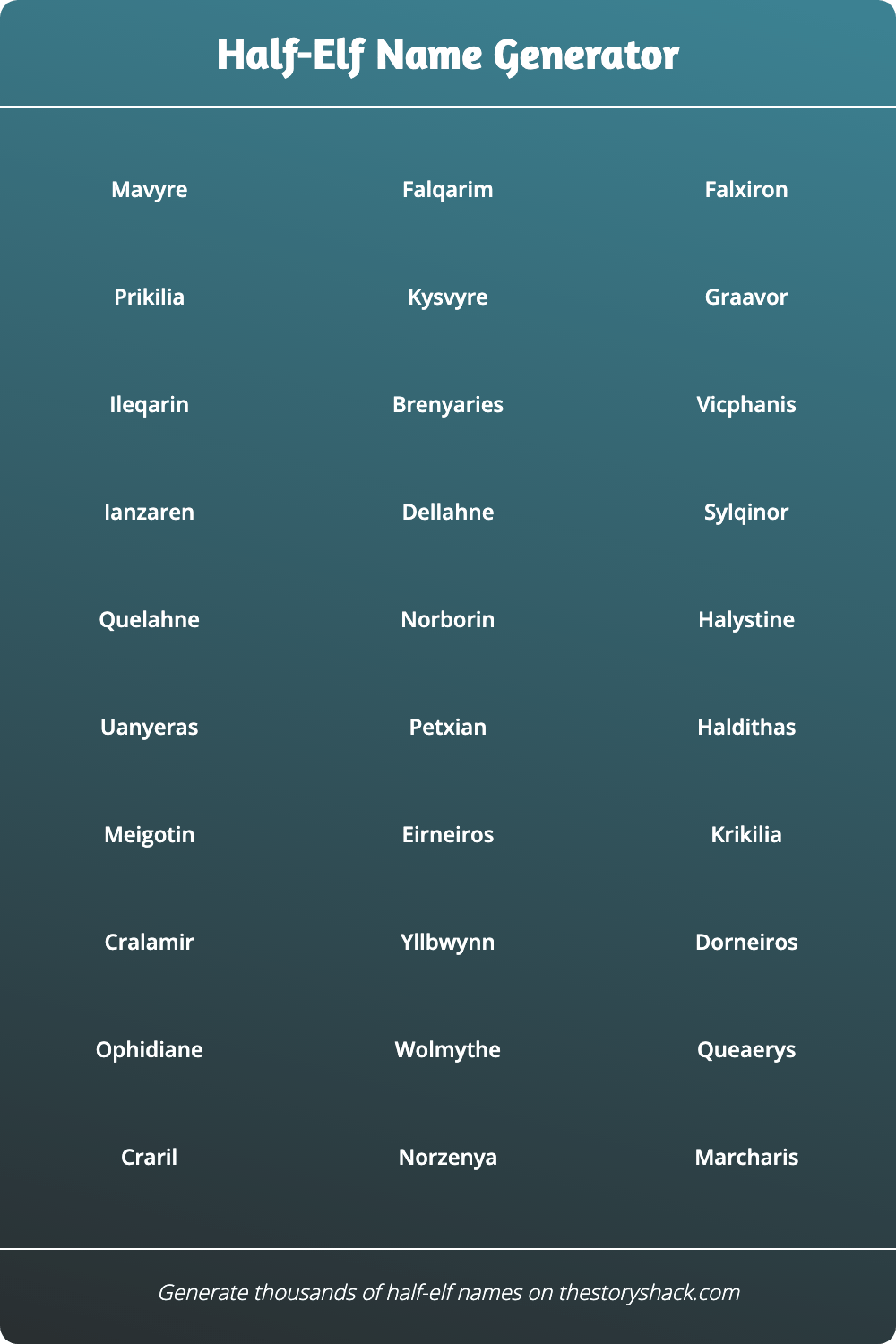Choosing a name for your Dungeons & Dragons character is more than just picking a label. It's about breathing life into your creation, giving them a unique identity in the world you're building. For half-elves, this process carries a special weight, reflecting their dual heritage and often complex place in society.
Half-elf names in D&D 5e are a reflection of their blended ancestry, often drawing inspiration from both elven and human cultures. Finding the right name can be crucial for establishing your character's backstory and personality. Do they embrace one side of their heritage more than the other? Or do they seek a balance, forging a new identity that honors both lineages?
The core rulebooks offer some guidance, suggesting that half-elves sometimes adopt human names to fit in better with human communities. Other times, they might choose an elven name, perhaps to connect with their elven heritage or to reflect a upbringing in an elven community. And sometimes, they might choose a name that's entirely their own, a unique blend of influences that represents their individual identity.
This freedom of choice, however, can feel overwhelming. Where do you begin? How do you craft a name that feels authentic, that resonates with your character's story and the world they inhabit? This article explores the nuances of half elf naming conventions in D&D 5e, offering insights and inspiration to help you find the perfect name for your character.
Understanding the cultural context of your campaign setting is key to crafting appropriate names. Different regions and societies may have unique naming traditions. Some might favor more elaborate elven names, while others might lean towards simpler, more practical human names. Considering these cultural nuances can add depth and authenticity to your character's identity.
Historically, half-elves in D&D have often been portrayed as individuals caught between two worlds, sometimes struggling to find acceptance in either. This sense of duality is often reflected in their names, serving as a subtle indicator of their internal conflicts and external pressures. In earlier editions, naming conventions were less formalized, leaving more room for player interpretation.
The importance of a well-chosen half-elf name goes beyond simple identification. It adds flavor and depth to roleplaying, allowing you to embody your character more fully. A name can convey a sense of elegance, strength, or even vulnerability, all contributing to a richer gaming experience.
One benefit of thoughtful half-elf name selection is enhanced roleplaying immersion. A name like "Anya Whisperwind" evokes a different image than "John Smith," influencing how you portray your character and how others perceive them.
Another benefit is the contribution to world-building. By choosing names that align with the lore and culture of your campaign setting, you contribute to a more immersive and cohesive narrative.
Finally, a well-crafted name can enhance character development. The process of choosing a name can encourage you to think more deeply about your character's background, motivations, and personality.
Advantages and Disadvantages of Different Naming Conventions
| Convention | Advantages | Disadvantages |
|---|---|---|
| Primarily Elven Names | Connects to elven heritage, adds a sense of elegance and mystery | May stand out in human societies, could lead to prejudice or misunderstanding |
| Primarily Human Names | Facilitates integration into human societies, promotes a sense of belonging | May feel disconnected from elven heritage, could lead to a sense of lost identity |
| Blended Names | Represents the duality of heritage, allows for creative expression | May not fully fit in either society, could be perceived as indecisive or rootless |
Examples of Half-Elf Names: Faelar Swiftbow, Liam Riverwood, Elara Meadowlight, Kaelen Brightstar, Alana Moonwhisper
Tips and Tricks: Consider using online name generators specifically designed for D&D, look to fantasy literature and mythology for inspiration, and don't be afraid to experiment with different combinations of sounds and meanings.
In conclusion, choosing a half-elf name for your D&D 5e character is a significant step in bringing them to life. It’s a process of discovery, where you explore the nuances of their dual heritage and find a name that resonates with their individual story. A well-chosen name can enrich your roleplaying experience, enhance immersion in the game world, and contribute to the overall narrative of your campaign. By carefully considering the cultural context, exploring different naming conventions, and tapping into your creativity, you can craft a name that truly embodies your character's unique identity and sets them on a path to unforgettable adventures. Don't underestimate the power of a name. It's the first step in forging a legend. Take your time, explore the possibilities, and find the perfect name that speaks to the heart of your half-elf character.
The ultimate guide to tiktok shop gift cards
Gifting starbucks via facebook a modern coffee ritual
Mastering formal closings in french correspondence
500 Wood Elf Names Generator - Khao Tick On
Female Elf Names Dnd - Khao Tick On
half elf names dnd 5e - Khao Tick On
half elf names dnd 5e - Khao Tick On
Pin von Carolina Cavallaro auf inspirações para RPG - Khao Tick On
half elf names dnd 5e - Khao Tick On
half elf names dnd 5e - Khao Tick On
half elf names dnd 5e - Khao Tick On
400 Best Dnd Half Elf Names That You Can Use - Khao Tick On
Sylvana by anoratheirin on DeviantArt - Khao Tick On
DnD Half Elf Name Generator - Khao Tick On
Detailed table of the four original races of my homebrew DD world as - Khao Tick On
Pin by Charlotte Kempe on BOYS - Khao Tick On
Best 250 DnD Elf Names With Meanings - Khao Tick On
half elf names dnd 5e - Khao Tick On














